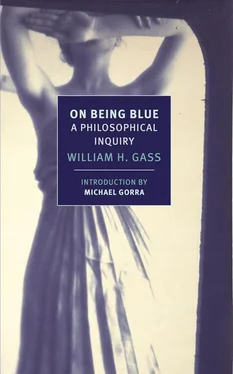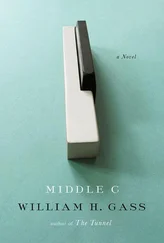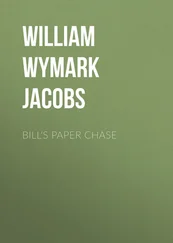Barth is satisfied to say that the girl was ravished unmercifully, but so little is this whole scene tinged with blue that a lively newspaper might carry the account. Rape is on the rise, we read, nearly every day. Now Ebenezer Cooke’s servant, Bertrand, an unreliable rogue, is a little distance behind him ‘watching with undisguised avidity.’ If he had written the passage we would have had a lengthy description of the great Moor’s member. Our camera would zoom toward the netted wench until it passed, with him, into her womb. Nor should we find poor Bertram’s interest odd, since most of us share it, and, like Gullivers in Brobdingnag, inflate the objects of our greed, deify the origins of every itch, enlarge our lusts, as a coin in the palm of a miser becomes the whole orb of the earth. The deck of the Cyprian, however, is not in the world. It needs no hull beneath it, then, no ocean even. It has been wisely noted, in this regard, that we are quite obliged to eat, but there are some perfectly splendid books that never mention the matter.
A crowd of considerations gathers. Here I can pay heed only to a few. It will be observed that Barth, who is a master of the narrative art, modulates the size of his events very carefully, and monitors their pace. It’s true that he singles out the girl in the rigging for slightly extended treatment, but this extension is discreet, and even then there is a reason for it: she may be the heroine, Joan Toast.
An author is responsible for everything that appears in his books. If he claims that reality requires his depiction of the sexual, in addition to having a misguided aesthetic, he is a liar, since we shall surely see how few of his precious passages are devoted to chewing cabbage, hand-washing, sneezing, sitting on the stool, or, if you prefer, filling out forms, washing floors, cheering teams.
Furthermore, the sexual, in most works, disrupts the form; there is an almost immediate dishevelment, the proportion of events is lost; sentences like After the battle of Waterloo, I tied my shoe, appear; a sudden, absurd and otherwise inexplicable magnification occurs, with the shattering of previous wholes into countless parts and endless steps; articles of underclothing crawl away like injured worms and things which were formerly perceived and named as nouns cook down into their adjectives. What a page before was a woman is suddenly a breast, and then a nipple, then a little ring of risen flesh, a pacifier, water bottle, rubber cushion. Without plan or purpose we slide from substance to sensation, fact to feeling, all out becomes in, and we hear only exclamations of suspicious satisfaction: the ums, the ohs, the ahs.
Unless we continue to drain through the cunt till we reach metaphor, as Henry Miller often does:
A dark, subterranean labyrinth fitted up with divans and cosy corners and rubber teeth and syringas and soft nestles and eiderdown and mulberry leaves. I used to nose in like the solitary worm and bury myself in a little cranny where it was absolutely silent, and so soft and restful that I lay like a dolphin on the oyster banks. A slight twitch and I’d be in the Pullman reading a newspaper or else up an impasse where there were mossy round cobblestones and little wicker gates which opened and shut automatically. Sometimes it was like riding the shoot-the-shoots, a steep plunge and then a spray of tingling sea-crabs, the bulrushes swaying feverishly and the gills of tiny fishes lapping against me like harmonica stops.
It’s true that Miller occasionally forgets himself. Still, he should be forgiven what we all want: forgetting within the fuck. Love is a nervous habit. Haven’t many said so? Snacking. Smoking. Talking. Joking. Alike as light bulbs. Drinking. Drugging. Frigging. Fucking. Writing. Forgetting. Nerves. Nerves, nerves, nerves. Our author does not, in fact, get sufficiently inside his line, forget enough to be forgiven. He talks too much, compulsively, his memory is made of suspiciously precise lies, the over — large anecdotal detail — yowl, stance, and quim size, garlic and onion, vestibule or stairway — like one of those guides at the Vatican.
• • •
The common deer in its winter coat is said by hunters to be in the blue. To be in the blue is to be isolated and alone. To be sent to the blue room is to be sent to solitary, a chamber of confinement devoted to the third degree. It’s to be beaten by police, or, if you are a metal, heated until the more refrangible rays predominate and the ore is stained like those razor blades the sky is sometimes said to be as blue as, for example, when you’re suddenly adrift on a piece of cake or in a conversation feel a wind from outer space chill your teeth like a cube of ice. Ah, but what is form but a bum wipe anyhow? Let us move our minds as we must, for form was once only the schoolyard of a life, the simple boundary of a being who, pulsating like an artery, drew a dark line like Matisse drew always around its own pale breath. Blue oak. Blue poplar. Blue palm. There are no blue bugs of note, although there are blue carpenter bees, blue disk longhorn beetles, blue-winged wasteland grasshoppers, one kind of butterfly, bottle-fly, the bird, and not a single wasp or spider. The muff, the fur, the forest, and the grot.
So it always is as we approach the source of our desires. As Rilke observed, love requires a progressive shortening of the senses: I can see you for miles; I can hear you for blocks; I can smell you, maybe, for a few feet, but I can only touch on contact, taste as I devour. And as we blend, sight, the sovereign sense and concept’s chief content, blurs. ‘The lover,’ Rilke wrote, ‘is in such splendid danger just because he must depend upon the co-ordination of his senses, for he knows that they must meet in that unique and risky centre, in which, renouncing all extension, they come together and have no permanence.’
A flashlight held against the skin might just as well be off. Art, like light, needs distance, and anyone who attempts to render sexual experience directly must face the fact that the writhings which comprise it are ludicrous without their subjective content, that the intensity of that content quickly outruns its apparent cause, that the full experience becomes finally inarticulate, and that there is no major art that works close in. Not an enterprise for amateurs. Even the best are betrayed.
Caspar Goodwood suddenly takes Isabel Archer in his arms: ‘His kiss was like white lightning, a flash that spread and spread again, and stayed…’ and Henry James, quite unconsciously, goes on to say that ‘it was extraordinarily as if, while she took it, she felt each thing in his hard manhood that had least pleased her, each aggressive fact of his face, his figure, his presence, justified of its intense identity and made one with this act of possession.’ But he never made this mistake again.
The blue lucy is a healing plant. Blue john is skim milk. Blue backs are Confederate bills. Blue bellies are Yankee boys. Mercurial ointment, used for the destruction of parasites, is called blue butter, although that greenish-blue fungus we’ve all seen cover bread is named blue-mold instead.
So Barth wisely remarks that the lady was ravished unmercifully and turns his hero sadly away. But the deck of the Cyprian is not in this world. Would we be content here, where we are, napkin at neck, to stare distantly at our beef, to receive reports that we had eaten without the pleasures of the chewing? No — only close-ups will content us here. We approach, indeed, until it’s entered us. The difference between ‘the beef’ and ‘the blue’ may seem at the same time too wide and too narrow to be of significance. Although, in many ways, these appetites are quite alike, there is no comparable literary mode dedicated to the seared and steaming flank; the mark of every tooth is nowhere with joy recorded; the floods of saliva, the growls which empty from the throat, the delight of every bite and swallow, the slice of the knife, its grate on the plate beneath, the hot… the glands groan as I describe it… the spicy hot sauce in which the sausage swims… there’s no Homer for them; there’s no Henry Miller either, or Akbar del Piombo; there’s only James Beard and Julia Child, masters of the shopping list.
Читать дальше












